Jun 3, 2025 11:25 AM
In Memoriam: Al Foster, 1943–2025
Al Foster, a drummer regarded for his fluency across the bebop, post-bop and funk/fusion lineages of jazz, died May 28…
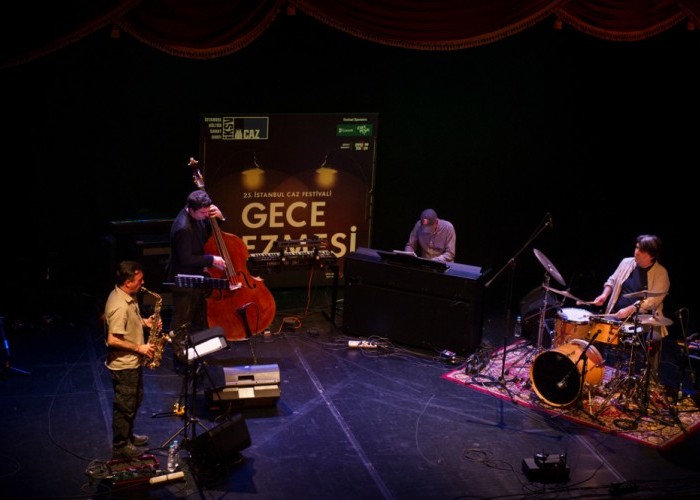
Selim Selçuk performs on the second night of the Vitrin Contemporary Turkish Music Showcase at the Zorlu Center in Istanbul, Turkey.
(Photo: Ilgin Erarslan Yanmaz)Earlier this year, at the age of 61, Istanbul-based drummer Selim Selçuk released his first recording. The two-volume Miles Kuçles (pbmüzik) is a sprawling collection of densely packed jazz that freely floats between electric and acoustic, rock and Turkish folk elements, modern and avant-garde jazz, played by a quartet of Turkish and American musicians. But how it came to be, and why Selçuk—the son of Münir Nurettin Selçuk, an acclaimed Turkish classical musician and composer—took so long to issue the music, is an odyssey involving two countries, 9/11, a run-in with landlords and health issues.
The following has been edited for length and clarity.
What does the title of your album, Miles Kuçles, mean?
You know Miles Davis did a song called “Selim Sivad,” yes? That was his name backwards. I was very young in those years, 17 I guess, and I loved the coincidence that Miles’s name backwards was the same as my name forwards. I said, “One day, I will make an album with my name backwards, Miles Kuçles” [pronounced ME-less KOOJ-less].
Are those your original compositions?
Yes. First, we played songs of mine from 1987. I was young then. I have too many compositions and a lot of projects, even though this is my first album ever. I’m composing since I was five, six years old. My father is the greatest classical Turkish music singer and composer, ever. My mother was a theater actress; my older brother, 10 years older than I am, he’s a famous singer, composer and arranger.
So, I grew up under the piano, checking out the sounds and thinking about making my own. I started to play the piano, and then I started to compose, but there wasn’t this kind of recording yet. Hundreds of my compositions are gone. But some of these compositions are with me, so I’m going to try to release them.
I have played so many different styles of music. With my brother, I started to play pop music; he was a popular-music singer. I played in professional orchestras, concert and recording sessions when I was 15 or 16. And after I started listening to jazz, I started doing that, too. Plus rock, plus Turkish music, of course, because of my mother and father. So many different kinds of music are tugging at my soul.
What took you this long to make your first recording?
I tried to make a recording a few times, but things kept happening in life. For a long time, I wasn’t thinking about making recordings. I was so busy as a musician or as a student, studying music. And then I operated a jazz club in Bosphorus [ed. note: a neighborhood on the European side of the Bosphorus Strait, which separates the European and Asian sides of Istanbul] called Naima. So, I was living the jazz-club life.
The first time I tried to make a recording was in 1992, when I was 35 and living in New York with my second wife. She studied at CUNY, that building on Fifth Avenue, and I started to go to the Mannes School of Music; I studied there with Billy Hart. I was putting things together to make a recording when we got divorced after three years, even though we were still very much in love. Six or seven months after we got divorced, she died in a car accident. I was shocked so badly that I lost about one-third of my memory at that time.
After that, I could have made a recording again, but 9/11 happened. I was staying in Flushing at that time, and I stayed in my house for a week, watching TV, just shocked. Then a few months later, I went back to Turkey. I was a drummer, so I was in New York carrying big boxes, cases; I’m a Muslim and I’m driving a van. Anybody could call in and say, “This guy looks suspicious.” It wasn’t the same New York, wasn’t the same America. I used to think, “I’m from New York, I’m part of it and it’s part of me.” And now it was gone.
So, I came back here and started again. Opened up another jazz club. I named it Naima again; this was in 2008. The ending was the annual celebration for Naima, and the landlord’s son—he came and [evicted me], told me to leave in two hours. Musicians were playing, celebrating the first year, and that same night he came. I said “You’re kidding, right? Have some Scotch.” He said, “No, I’m not kidding ... get going.” We had to empty the club of everything we had time and space to get, and that was the end of second Naima. So, I’ve had both the musician’s life, and the club owner’s life. That was the end of jazz clubs, but I was still a musician.
But what happened between the end of the jazz clubs and this current release?
OK. I have brain damage—a heart attack and brain damage. Come here. [Grabs the journalist’s hand and puts it on a rough protrusion on the upper-right side of his skull.] Do you feel it? That part of my skull was off for two years. I had a brain hemorrhage in 2014. I fell down a flight of stairs; I don’t remember it. I woke up in the hospital. Last night, was one of my first times playing drums since.
So, you just started playing drums again?
Yeah, I forgot everything. The left side of my body was gone; I couldn’t even hold a drumstick. I thought I couldn’t play drums anymore, and my memory was gone, too. I couldn’t feel one measure—you know, one, two, three, four, back to one? I couldn’t feel that corner of the measures. And in Turkish music, we have 7/8, 7/4, fives and nines and 11s. I used to play jazz drums that way, mixing fours and fives and sevens and everything, and now it was garbage.
I would never have guessed that. Everything you played last night was fantastic.
I can play maybe 50 percent of what I could have done before. It’s getting better. It gradually came back, is what happened; I would sit down and try to play, and it wouldn’t work. But then I’d try again, try again, getting slowly easier. But you have to play a lot.
This is the wrong country and the wrong place—I’m not rich, and I don’t have a lot of money to rent a big huge place and play as much as I want, as hard as I want.
So how did this recording get made?
My producer, Hakan Kurşun, is a very good guy. He was always asking me, “Why don’t you come? I have a studio, I’ll take care of everything. Let’s record this stuff.” We recorded it five years ago, and he has been trying ever since to get me to release it. Actually, I didn’t like the recording. But anytime he got some beer, I’d get a call at midnight: “Why don’t you release this stuff?” I would say “I don’t like this part, I don’t like that part.” Next year, he’d call me again. Finally, he released it earlier this year.
One of the things I took from hearing your compositions was that it’s often very challenging harmonically and rhythmically, but there was always a very strong, very simple melody.
Yes, you can sing it—or whistle it when you’re taking a shower. Rhythmically and harmonically, we’re playing a mix of modern and avant-garde jazz, and also some ethnic things. But what I want people to remember is the melody, and to be singing it when they leave. Remember and sing. It takes 40 years to build that formula. DB
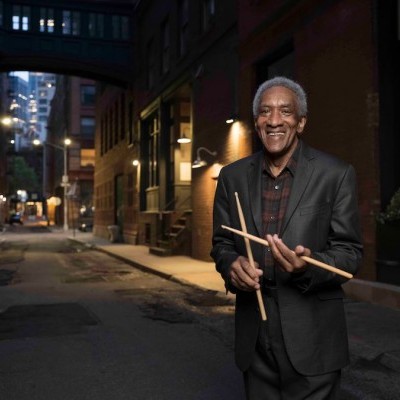
Foster was truly a drummer to the stars, including Miles Davis, Sonny Rollins and Joe Henderson.
Jun 3, 2025 11:25 AM
Al Foster, a drummer regarded for his fluency across the bebop, post-bop and funk/fusion lineages of jazz, died May 28…
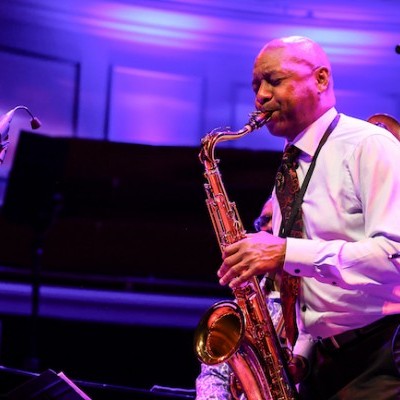
“Branford’s playing has steadily improved,” says younger brother Wynton Marsalis. “He’s just gotten more and more serious.”
May 20, 2025 11:58 AM
Branford Marsalis was on the road again. Coffee cup in hand, the saxophonist — sporting a gray hoodie and a look of…
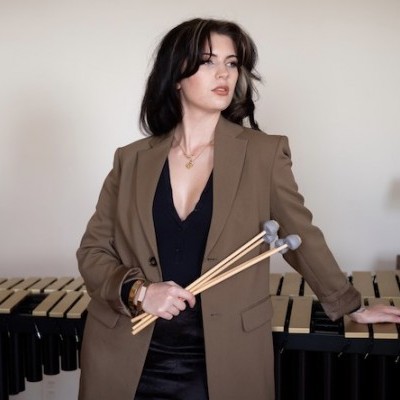
“What did I want more of when I was this age?” Sasha Berliner asks when she’s in her teaching mode.
May 13, 2025 12:39 PM
Part of the jazz vibraphone conversation since her late teens, Sasha Berliner has long come across as a fully formed…

Roscoe Mitchell will receive a Lifetime Achievement award at this year’s Vision Festival.
May 27, 2025 6:21 PM
Arts for Art has announced the full lineup for the 2025 Vision Festival, which will run June 2–7 at Roulette…
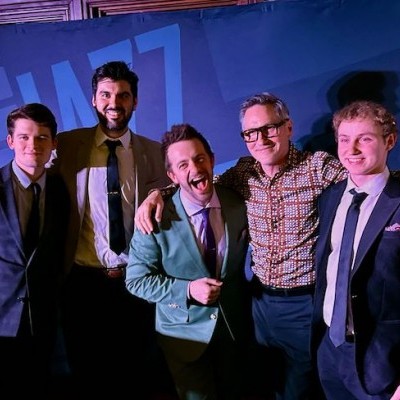
Benny Benack III and his quartet took the Midwest Jazz Collective’s route for a test run this spring.
Jun 3, 2025 10:31 AM
The time and labor required to tour is, for many musicians, daunting at best and prohibitive at worst. It’s hardly…